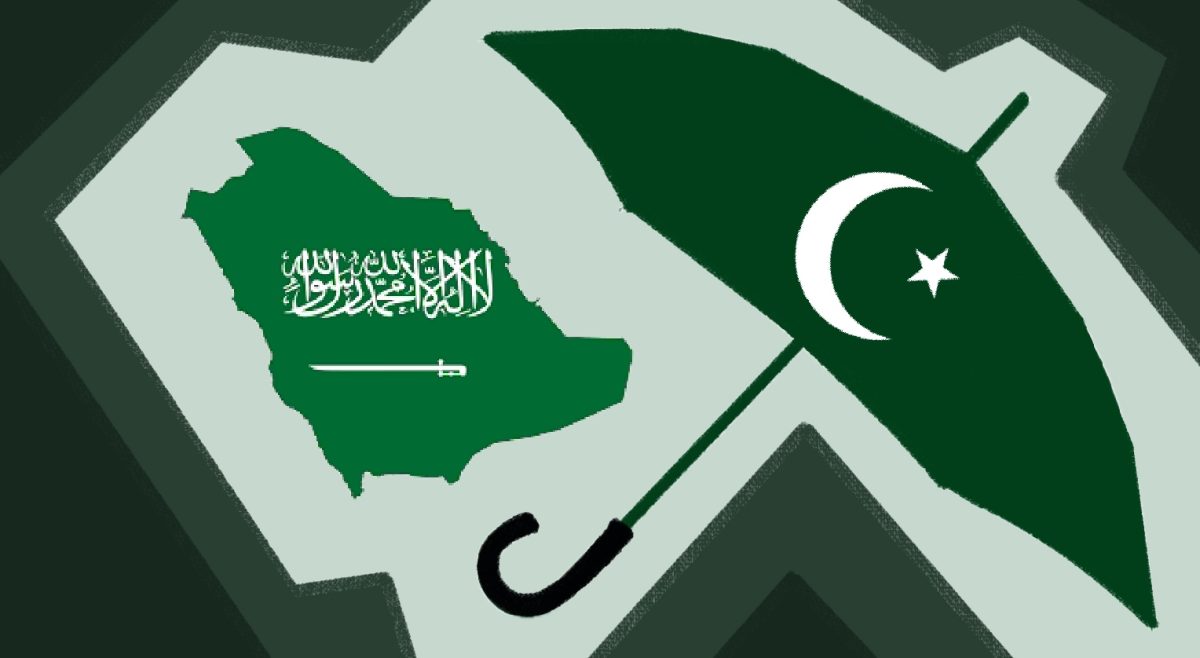
( Connor O'Brien/ Heights Editor)
Defense umbrellas have long been a hallmark in alliance formation, with nuclear protection serving as the most powerful deterrent in international agreements. Recently, Saudi Arabia and Pakistan signed a new defense agreement which will extend Pakistan’s nuclear umbrella into the Middle East. This development significantly challenges U.S. hegemony, which has traditionally relied on power from providing security guarantees and deterrence to its allies.
Confirmation of this nuclear dimension comes from statements made by Khawaja Asif, Pakistan’s defense minister: “What we have, and the capabilities we possess, will be made available to (Saudi Arabia) according to this agreement,” and, “This is an umbrella arrangement offered to one another by both sides: if there is aggression against either party, from any side, it will be jointly defended, and the aggression will be met with a response.” While the agreement does not explicitly mention a nuclear umbrella, the remarks strongly suggest that Pakistan’s capabilities, including its nuclear program, could be used to defend Saudi Arabia in the event of aggression.
The timing of this deal is particularly noteworthy, coming just after the Israeli airstrike in Qatar that targeted Hamas officials residing there. The strike raised questions about U.S. involvement, as reports suggested Washington may have known about the operation in advance but did not intervene. This is striking given that Qatar hosts the largest U.S. military base in the Middle East, a presence partly intended to reassure allies of American deterrence capabilities. If the U.S. had prior knowledge yet did nothing, it sends a troubling message to allies—the presence of U.S. troops on your soil does not guarantee protection.
This perception is especially concerning for U.S. allies in Europe, who have long relied on American deterrence against threats such as Russia. To defend the United States’ point of view, Qatar did allow Hamas, designated a terrorist organization by both the U.S. and Israel, to operate within its territory, albeit in the context of attempted negotiations. While this complicates the situation, it does not fully change the perception of eroding U.S. reliability. Washington, for its part, has denied advance knowledge of the Israeli strike.
The Saudi-Pakistani defense pact must be understood against this backdrop. The deal was finalized shortly after the Qatar strike, signaling that U.S. nuclear deterrence in the region now faces competition from Pakistan. For Saudi Arabia, this agreement enhances security—for Pakistan, it provides renewed relevance at a time when economic aid and military assistance from both Beijing and Washington have diminished. Pakistan’s main source of leverage remains its nuclear capabilities, something Saudi Arabia lacked until this partnership.
As a result, the status quo in the Middle East has shifted. With this agreement, Pakistan emerges as a new challenger to U.S. influence by extending its nuclear protection to a key regional power. Washington has already faced a credibility crisis in the region, from the withdrawal from Afghanistan to the controversy surrounding Israeli operations after the Oct. 7 attacks. While debates about the morality of U.S. involvement persist, it’s clear that regional actors now see an opportunity to assert greater autonomy. Saudi Arabia and Pakistan have seized this moment, strengthening their relationship in ways that both expand their independence and reduce reliance on Washington.